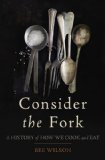Reading Guide Questions

Please be aware that this discussion guide will contain spoilers!
- Bee Wilson covers a wide range of culinary tools in Consider the Fork, but obviously she could not include everything. Are there any tools that you wish had been included in this book, but weren't? More generally, what tools continue to be underappreciated or underused—and do these share any characteristics with the ones that Wilson does discuss in the book?
- Put together a list of must-have kitchen tools. Where do you draw the line between essential utilities that no cook can operate without, and frivolous accessories that just clutter up the kitchen?
- In the chapter "Grind," Wilson writes that the Cuisinart "trans -
form[ed] cooking from pain to pleasure"—and yet she confesses to
still using "obsolete" or needlessly labor-intensive technologies, such as when she grinds basil and garlic with a mortar and pestle to make pesto. Do you ever choose to make food in an old-fashioned way, even when more advanced tools are available? If so, why?
- Is your appreciation for food diminished when it's prepared quickly and relatively effortlessly? Would you enjoy butter more if you knew that hours of human labor went into it, or would meringues be more delectable if you knew that multiple people had tired themselves out to stiffen the egg whites? Is speed and convenience a luxury when it comes to cooking and eating, or is "slow food" more of a pleasure?
- Can you think of utensils that were once widely used, but which have since disappeared from most kitchens? Did any of these items work better than the ones that replaced them, in your opinion?
- Even after the development of indoor gas ranges, cooks clung to the time-tried method of hearth cooking despite its many dangers. Are there any technologies that people continue to use today, despite the obvious risks associated with them?
- One of Wilson's arguments is that culinary technologies have shaped the human body, in ways that we often don't think of; the alignment of our teeth, for instance, is intimately connected to our use of knives. Are there other kitchen tools that have had an impact on our bodies? On our minds?
- The tools that we use to present and consume food can be every bit as central to our experience of eating as the food itself: few people would choose to eat sushi with a fork, say, or to drink expensive wine out of a paper cup. Think of your favorite food: does it have a specific utensil associated with it? If so, what does that utensil say about you—either the personal culinary traditions you have inherited, or those that you have chosen for yourself?
- Wilson's book ends with a look at molecular gastronomy, and the scientific tools and techniques of "modernist" chefs around the world. Is modernist cooking a passing trend, or are some of the tools it has generated—the sous-vide machine, for instance—here to stay?
- "The 'kitchen of tomorrow,'" Wilson writes, "was a staple of twentieth-century life." What does the "kitchen of tomorrow" look like, at the dawn of the third millennium? Are there certain tools, techniques, or kitchen design elements that will never go out of style, no matter how many years go by?
Unless otherwise stated, this discussion guide is reprinted with the permission of Basic Books.
Any page references refer to a USA edition of the book, usually the trade paperback version, and may vary in other editions.

 Book Reviewed by:
Book Reviewed by:



